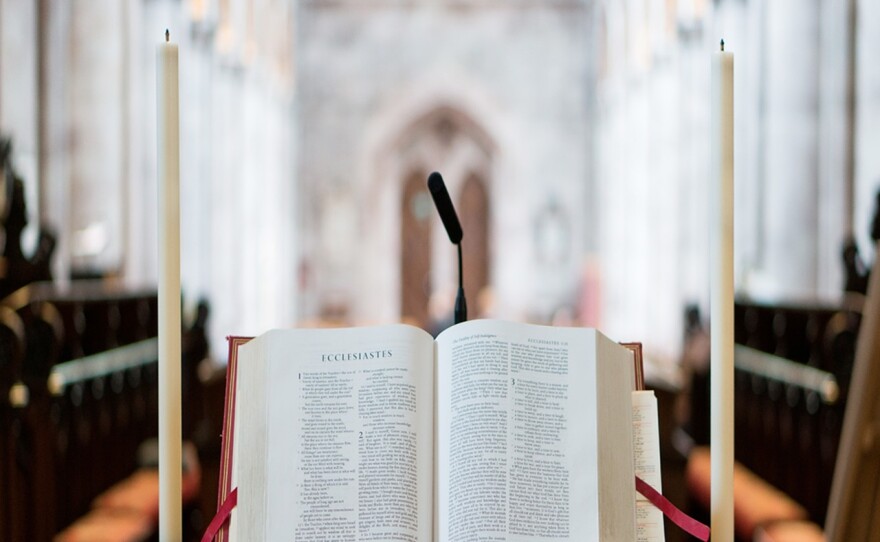Last week, the IRS, in a court filing, raised a lot of eyebrows by breaking a 71-year-old precedent when it said that places of worship could endorse political candidates from the pulpit without fear of losing their tax-exempt status.
Since 1954, a provision in the tax code called the Johnson Amendment — named after its author, then senator Lyndon Johnson — says that churches and other nonprofit organizations could lose their tax-exempt status if they participate in, or intervene in "any political campaign on behalf of (or in opposition to) any candidate for public office."
It was almost never enforced, but, nonetheless, it has hung over the heads of religious institutions like the Sword of Damocles for churches, synagogues, and mosques should their leaders dare to cross the line into using their pulpits and power to openly endorse and stump for specific candidates and political parties.
The change in IRS policy came in a lawsuit filed by the National Religious Broadcasters, a group made up of Evangelical Christian churches, arguing that the Johnson Amendment tramples on their First Amendment rights to the freedom of speech and the free exercise of religion.
As of last week, the IRS agrees.
The IRS is taking its cue from President Donald Trump, who said during his first term that he wanted to "totally destroy" the Johnson Amendment and free religious institutions to “speak freely and without fear of retribution.”
But just how far that freedom extends is still up for debate.
The move 'acknowledges reality'
Mack D. Mariani, political science professor at Xavier University, said the IRS change of policy may just be a recognition of the role religion plans in political discourse today.
“Some churches have been very political for a very, very long time,’’ Mariani said.
The new IRS policy “just acknowledges the reality that every church is on the same level playing field when it comes to politics.”
But Mariani said there is a vast difference between a pastor using the pulpit in his or her own church to tell parishioners they should vote for a specific candidate and work to get that candidate elected and taking out a full page ad or buying commercial TV air time touting a candidate or political party.
“Talking to your congregation is one thing,” Mariani said. “Taking out full page ads may be seen as quite another.”
The National Religious Broadcasters lawsuit was driven by large, evangelical mega-churches with deep pockets and pastors who already have political clout.
'Another expression of Christian nationalism'
But the majority of houses of worship do not seek the power to endorse candidates.
Clifton United Methodist Church in Cincinnati is one of them.
It is a church well-known for its social justice ministry. It is part of the United Methodist Church’s Reconciling Ministries Network; and the Clifton church describes itself as a “welcoming and safe harbor” for the LGBTQ+ community.
Shortly after the IRS announced its new policy about endorsing political candidates, Rev. Robert English, the lead pastor at Clifton United Methodist, sent a very clear and direct message to his congregation via email.
“I want to be clear: I take the call to proclaim the Word of God very seriously, and I will never endorse a candidate or political party from the pulpit or in my role as Lead Pastor of Clifton United Methodist Church,” English wrote. ”I believe this IRS policy development is yet another expression of the heresy of Christian nationalism — which I reject.”
“Sometimes, political life intersects with the Gospel: when a ballot measure or piece of legislation helps vulnerable people, we may feel a calling to support it; or, in the inverse, when a ballot measure or law harms the most vulnerable, our Gospel conviction may drive us to speak out,” the pastor said. “But this is because of our careful, thoughtful allegiance to the Gospel, not because of blind allegiance to any particular political stance.
“I believe the role of proclamation in the church is not about telling you what to think or believe, but about inviting all of us into shared, mutual transformation by the power of the Holy Spirit. It is one reason I often say: you don’t have to believe what I believe to belong here.“
There are houses of worship like Clifton United Methodist where the congregation is mostly united on social justice issues and, as individuals, more than willing to get involved in partisan politics on a personal level when they find a cause or a candidate who fits their beliefs. But they don’t need to be instructed from the pulpit on who those candidates should be.
Mariani said it is normal that people who are likeminded on political issues gather together in churches.
“Sometimes where people gather to worship is a lot like the way people choose the neighborhoods where they live,” Mariani said. “They move to places that fit their politics.”
The Roman Catholic Church, Mariani said, is much different.
“It is very broad; it is in every corner of the world,” Mariani said. “People of all manner of political beliefs come together to worship at a Catholic mass. It’s about faith, not politics.”
That, Mariani said, is why you will never hear this disclaimer at the end of a 30-second campaign ad:
I’m Pope Leo XIV; and I approve this message.
Read more:




